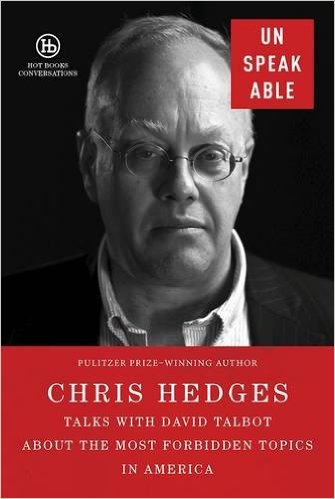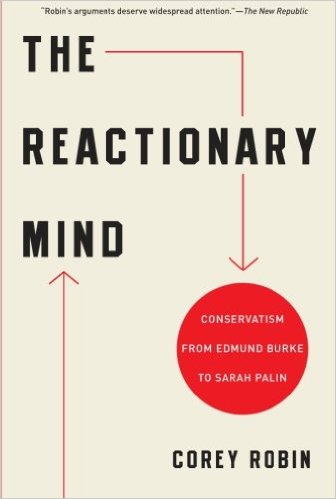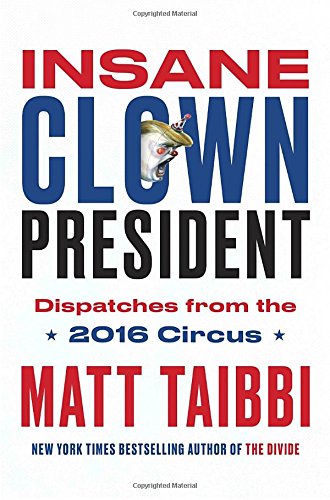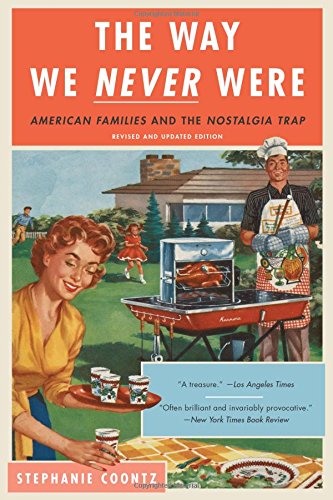Book: Unspeakable by Chris Hedges
Tuesday 28 February 2017 Chris Hedges is someone I respect a hell of a lot. He is one of the few people today who is not afraid of really just speaking the truth. Despite all of Trump's talk about how the media is all fake news, the mainstream media in fact really just toes the party line as far as corporate interests. The sad truth in American politics today is that once you get past all the little details that the two political parties try to get people all worked up about the two parties really agree on most economic issues. The two parties get their constituents all riled up about issues that honestly won't really effect people's lives that much - and while everyone is busy arguing over who can urinate in what bathroom they conduct the real work of the government which essentially is catering to large corporations.
Chris Hedges is someone I respect a hell of a lot. He is one of the few people today who is not afraid of really just speaking the truth. Despite all of Trump's talk about how the media is all fake news, the mainstream media in fact really just toes the party line as far as corporate interests. The sad truth in American politics today is that once you get past all the little details that the two political parties try to get people all worked up about the two parties really agree on most economic issues. The two parties get their constituents all riled up about issues that honestly won't really effect people's lives that much - and while everyone is busy arguing over who can urinate in what bathroom they conduct the real work of the government which essentially is catering to large corporations.
Very few people in America are willing to even acknowledge this. Third party candidates are dismissed as "throwing your vote away," which is largely true, but only because the media doesn't take any third party seriously enough to give them any real chance. Granted this is largely due to the US winner-take-all electoral system, which I would argue only exists because the founding father's didn't foresee the rise of political parties, but the end result is that if you disagree with the two parties in any substantial way you won't be heard and won't be covered.
With Donald Trump calling any negative media coverage of him "fake news" he is distracting from the very real biases of the press. Hedges describes one example which was how the media was basically forced to act as a proganda arm of the Bush administration in selling their now disproven fiction about Iraq having WMDs in the early 2000s. The media was not forced to do this by the government, but by the corporate elite who own and run the media. After 9/11, in the ensuing wave of patriotism, any questioning of government policy was viewed as un-American, and strongly discouraged by the media, as Hedges personally experienced when he tried to protest the war.
The political parties can squabble all they want over whether to build a border wall, but when it comes to promoting the interests of multinational corporations there is little to no disagreement. When it comes to promoting unfettered free-market capitalism they are in lock step. The Republicans and Democrats may disagree on how much regulation there should be on Wall Street, and how high the corporate tax rate should be, but they will never question whether corporate interests are really best for the country, much less question whether capitalism as a system has inherent flaws.
Unspeakable: Chris Hedges on the Most Forbidden Topics in America is a rather short book, but it touches on many of the issues that I think about a lot. I think we are lucky that someone like him exists and is not afraid to question the prevailing economic dogma although he will be ostracized and ridiculed for it.
Labels:
books,
politics
No comments
 The Reactionary Mind: Conservatism from Edmund Burke to Sarah Palin, by Corey Robin, is a book of essays about conservatism from the 17th century to today. I have often struggled to try to figure out exactly what "conservatism" as a political philosophy actually means and I thought this book might shed some light. While it did have some interesting ideas, it didn't really do that great of a job answering my question.
The Reactionary Mind: Conservatism from Edmund Burke to Sarah Palin, by Corey Robin, is a book of essays about conservatism from the 17th century to today. I have often struggled to try to figure out exactly what "conservatism" as a political philosophy actually means and I thought this book might shed some light. While it did have some interesting ideas, it didn't really do that great of a job answering my question. When I first heard of this book I assumed it was an anti-Trump gimmick, designed and written solely to sell copies by capitalizing on the anger at Trump's election. It wasn't until I discovered that the book was written by Matt Taibbi that I actually decided to read it. Matt Taibbi is the author of what I consider to be one of the most important books on politics in this century "The Great Derangement," which analyzes recent fringe conspiracy movements in the light of what US politics have become. In "The Great Derangement" Taibbi investigates one right-wing movement - apocalyptic religious fundamentalists - and one left-wing movement - 9/11 Truthers - and concludes that both stem from the fact that the American political system has become so corrupt and so removed from any real democratic influence. Rather than getting angry that the government acts mostly in the interest of the multinational corporations and monied interests who fund the politicians and agitating for any real change, people instead focus on fringe conspiracy theories and become obsessed with the coming of the rapture or trying to figure out who was "really" behind 9/11. In the meantime the political parties promote the idea that they are idealogical opposites by getting the people to focus on and get angry about social issues like what bathrooms transgender people can use, gay marriage and abortion while both parties take jam through their agenda which benefits the very wealthy and the multinationals. But enough about that book...
When I first heard of this book I assumed it was an anti-Trump gimmick, designed and written solely to sell copies by capitalizing on the anger at Trump's election. It wasn't until I discovered that the book was written by Matt Taibbi that I actually decided to read it. Matt Taibbi is the author of what I consider to be one of the most important books on politics in this century "The Great Derangement," which analyzes recent fringe conspiracy movements in the light of what US politics have become. In "The Great Derangement" Taibbi investigates one right-wing movement - apocalyptic religious fundamentalists - and one left-wing movement - 9/11 Truthers - and concludes that both stem from the fact that the American political system has become so corrupt and so removed from any real democratic influence. Rather than getting angry that the government acts mostly in the interest of the multinational corporations and monied interests who fund the politicians and agitating for any real change, people instead focus on fringe conspiracy theories and become obsessed with the coming of the rapture or trying to figure out who was "really" behind 9/11. In the meantime the political parties promote the idea that they are idealogical opposites by getting the people to focus on and get angry about social issues like what bathrooms transgender people can use, gay marriage and abortion while both parties take jam through their agenda which benefits the very wealthy and the multinationals. But enough about that book... Hearing about how Donald Trump wants to "make America great again" for the last year and a half made me think when was America great? Since the 80s, conservatives have loved to talk about the decline in "family values" and how all social and economic problems stem from the lack of "traditional" families, usually referencing the 1950s Leave it to Beaver sitcom-style family as their model of what a good, decent traditional family should be. I suspected that such a family never really existed other than on TV, and I decided to read this book, "The Way We Never Were: American Families and the Nostalgia Trap" by Stephanie Coontz to get another opinion on this issue.
Hearing about how Donald Trump wants to "make America great again" for the last year and a half made me think when was America great? Since the 80s, conservatives have loved to talk about the decline in "family values" and how all social and economic problems stem from the lack of "traditional" families, usually referencing the 1950s Leave it to Beaver sitcom-style family as their model of what a good, decent traditional family should be. I suspected that such a family never really existed other than on TV, and I decided to read this book, "The Way We Never Were: American Families and the Nostalgia Trap" by Stephanie Coontz to get another opinion on this issue.